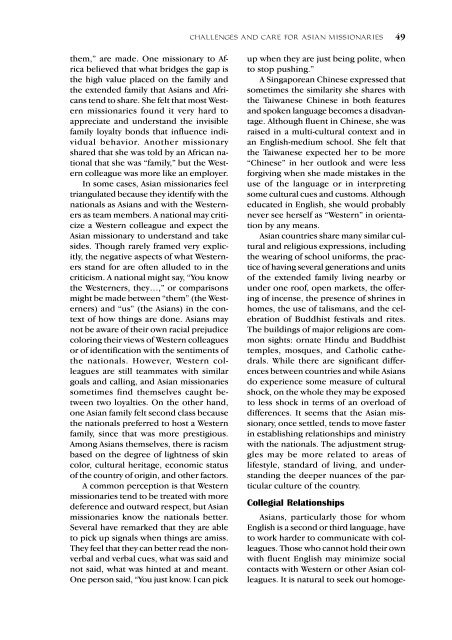Part 2 Regional Issues and Insights - World Evangelical Alliance
Part 2 Regional Issues and Insights - World Evangelical Alliance
Part 2 Regional Issues and Insights - World Evangelical Alliance
Create successful ePaper yourself
Turn your PDF publications into a flip-book with our unique Google optimized e-Paper software.
challenges <strong>and</strong> care for asian missionaries 49<br />
them,” are made. One missionary to Africa<br />
believed that what bridges the gap is<br />
the high value placed on the family <strong>and</strong><br />
the extended family that Asians <strong>and</strong> Africans<br />
tend to share. She felt that most Western<br />
missionaries found it very hard to<br />
appreciate <strong>and</strong> underst<strong>and</strong> the invisible<br />
family loyalty bonds that influence individual<br />
behavior. Another missionary<br />
shared that she was told by an African national<br />
that she was “family,” but the Western<br />
colleague was more like an employer.<br />
In some cases, Asian missionaries feel<br />
triangulated because they identify with the<br />
nationals as Asians <strong>and</strong> with the Westerners<br />
as team members. A national may criticize<br />
a Western colleague <strong>and</strong> expect the<br />
Asian missionary to underst<strong>and</strong> <strong>and</strong> take<br />
sides. Though rarely framed very explicitly,<br />
the negative aspects of what Westerners<br />
st<strong>and</strong> for are often alluded to in the<br />
criticism. A national might say, “You know<br />
the Westerners, they…,” or comparisons<br />
might be made between “them” (the Westerners)<br />
<strong>and</strong> “us” (the Asians) in the context<br />
of how things are done. Asians may<br />
not be aware of their own racial prejudice<br />
coloring their views of Western colleagues<br />
or of identification with the sentiments of<br />
the nationals. However, Western colleagues<br />
are still teammates with similar<br />
goals <strong>and</strong> calling, <strong>and</strong> Asian missionaries<br />
sometimes find themselves caught between<br />
two loyalties. On the other h<strong>and</strong>,<br />
one Asian family felt second class because<br />
the nationals preferred to host a Western<br />
family, since that was more prestigious.<br />
Among Asians themselves, there is racism<br />
based on the degree of lightness of skin<br />
color, cultural heritage, economic status<br />
of the country of origin, <strong>and</strong> other factors.<br />
A common perception is that Western<br />
missionaries tend to be treated with more<br />
deference <strong>and</strong> outward respect, but Asian<br />
missionaries know the nationals better.<br />
Several have remarked that they are able<br />
to pick up signals when things are amiss.<br />
They feel that they can better read the nonverbal<br />
<strong>and</strong> verbal cues, what was said <strong>and</strong><br />
not said, what was hinted at <strong>and</strong> meant.<br />
One person said, “You just know. I can pick<br />
up when they are just being polite, when<br />
to stop pushing.”<br />
A Singaporean Chinese expressed that<br />
sometimes the similarity she shares with<br />
the Taiwanese Chinese in both features<br />
<strong>and</strong> spoken language becomes a disadvantage.<br />
Although fluent in Chinese, she was<br />
raised in a multi-cultural context <strong>and</strong> in<br />
an English-medium school. She felt that<br />
the Taiwanese expected her to be more<br />
“Chinese” in her outlook <strong>and</strong> were less<br />
forgiving when she made mistakes in the<br />
use of the language or in interpreting<br />
some cultural cues <strong>and</strong> customs. Although<br />
educated in English, she would probably<br />
never see herself as “Western” in orientation<br />
by any means.<br />
Asian countries share many similar cultural<br />
<strong>and</strong> religious expressions, including<br />
the wearing of school uniforms, the practice<br />
of having several generations <strong>and</strong> units<br />
of the extended family living nearby or<br />
under one roof, open markets, the offering<br />
of incense, the presence of shrines in<br />
homes, the use of talismans, <strong>and</strong> the celebration<br />
of Buddhist festivals <strong>and</strong> rites.<br />
The buildings of major religions are common<br />
sights: ornate Hindu <strong>and</strong> Buddhist<br />
temples, mosques, <strong>and</strong> Catholic cathedrals.<br />
While there are significant differences<br />
between countries <strong>and</strong> while Asians<br />
do experience some measure of cultural<br />
shock, on the whole they may be exposed<br />
to less shock in terms of an overload of<br />
differences. It seems that the Asian missionary,<br />
once settled, tends to move faster<br />
in establishing relationships <strong>and</strong> ministry<br />
with the nationals. The adjustment struggles<br />
may be more related to areas of<br />
lifestyle, st<strong>and</strong>ard of living, <strong>and</strong> underst<strong>and</strong>ing<br />
the deeper nuances of the particular<br />
culture of the country.<br />
Collegial Relationships<br />
Asians, particularly those for whom<br />
English is a second or third language, have<br />
to work harder to communicate with colleagues.<br />
Those who cannot hold their own<br />
with fluent English may minimize social<br />
contacts with Western or other Asian colleagues.<br />
It is natural to seek out homoge-
















